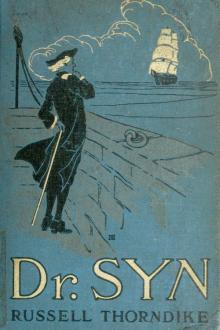Doctor Syn - Russell Thorndyke (new reading txt) 📗

- Author: Russell Thorndyke
- Performer: -
Book online «Doctor Syn - Russell Thorndyke (new reading txt) 📗». Author Russell Thorndyke
Meantime a lugger was trying to catch the breeze, trying to get out of the great bay to the open sea; but the wind had failed, so certain men aboard got out the oars and pulled away with a will. Then some fool lit one of the piled beacons on the shore. Others were lighted, and the flames shot up along the wall to Littlestone, and the King’s men managed to launch the preventer’s cutter and chase the lugger. The men routed out of the Ship Inn crowded to the wall to hinder the King’s men, but Collyer was in command and bravely kept his men’s heads for them amid a hail of bullets from the sea-wall.
The cutter was not long in swinging alongside the lugger, and Collyer clambered aboard, with three or four of his men armed with pistols and cutlasses. The men on the lugger had stopped rowing when they saw that they had no chance of escape, and as soon as the captain hailed them they surrendered sullenly.
The men at the oars were ordered into the cutter, and then the captain turned to the cabin. Outside the door sat Sexton Mipps with his blunderbuss lying across his knees, ready to hand. But he appeared quite calm, and was enjoying his short clay pipe.
“Good evening. Captain,” he said. “Coming out fishing with us, are you?”
“Lay that blunderbuss of yours on the deck,” answered the captain, “and step aboard the cutter after your pals.”
“I should like to know what you be,” said Mr. Mipps, “to order a respectable parish sexton about.”
“You won’t make it easier for yourself, my man, by lagging back,” said the captain. “I know quite enough about you to send you to the gibbet.”
“May I ask what?” replied the sexton, puffing away at his pipe.
“I’ve been having a look at that coffin shop of yours, and I’ve seen enough there to get you a free rope from the government; so come along and make the best of a bad job.”
Mipps pulled desperately at his short clay pipe and sent over his lap a heavy cloud of tobacco smoke. Under cover of this his fingers were stealing toward the trigger of the blunderbuss. He was calculating his chances, for there were three pistols pointing at him from the King’s men. If he was shot, he meant to take the captain with him.
“There’s one chance of saving your dirty carcass,” went on the captain, not noticing those crafty fingers moving.
“What’s that?” said the sexton behind the blue curtain of tobacco smoke.
“There’s one man I’d a deal sooner hang than you, and that’s Clegg. Tell me where Doctor Syn is and I’ll give you twenty -four hours to make yourself scarce.”
“Thank you kindly,” went on the sexton, “but I ain’t no wish to make myself scarce. I’m quite happy where I am, and if you’ve a fancy to make yourself scarce, I’ll be happier still.”
Just then there was a noise below of singing, and something splashed into the sea. The captain looked over the side and saw a black bottle. It was not a dark night, and he could see it floating away toward the shore, where the beacons were alight.
“He’s in that cabin!” the captain shouted. “He threw that rum bottle out of the stern hole.”
“If he is there,” replied the sexton, “I wouldn’t advise you nor any other of my friends to go in, for it’ll be the worse for you if you do. Hark! he’s in song tonight, and when Clegg’s in song, you can take it from me that he’s in a devil of a mood.”
From the cabin came that horrible song:
“Here’s to the feet wot have walked the plank.
Yo ho! for the dead man’s throttle.”
And then words were uttered in a drunken voice, the voice of a drunkard in terror.
“It’s the drink! There’s nobody there, there’s nobody in this cabin, I say. It’s a shadow, nothing but a shadow. He couldn’t have got here. It’s a shadow risen from hell to mock me, I say. He couldn’t have got off that reef. There was nothing for him to live upon but the filthy body of the yellow cook, and would even the foulest man eat food not fit for sharks? There was nothing else. No vegetation, simply a thin coral reef. I can hear the surf now breaking into the lagoon. There, listen! There, hark at him cursing! It’s no use, tell him. The crew’s afraid of me. They’re only muttering, they daren’t speak again, for I’ve settled with Pete, the yellow cook—broke his spine in with a capstan bar. How it did get wedged between the bone. I tore it out with my nails. There goes Pete’s body over the side into the clear water. Ugh! what a horrible splash it makes! The water doesn’t seem to hide him much! There’s his ugly yellow face still! Why don’t the water hide him? It hides lots of other ugly things, damn it! The breeze, thank God! We are slipping away, faster, faster. The coral reef is sinking into the deep sea. The marooned scoundrel, the damned mulatto, can’t throw a harpoon from there, he can’t! He’s dead already! Cram on the canvas, every inch! Get up aloft! Won’t take my orders, eh? Get up! Get up! I’ll teach you who Clegg is! Ah! look there! There’s something following the ship. WTiat a horrible face it has! My God, it’s yellow! Horrible! It’s coming out of the sea! It’s creeping over the stern, along the deck! It’s coming to the roundhouse! Lock the door! No! No! It’s here inside the roundhouse. You’ve locked it in with me, you fools! You cowards, it’s following me round! It isn’t him! It isn’t him! It’s a shadow—a damned silly shadow. WTiere’s the rum? Mipps, you damned little pirate, where have you hid the rum?
“Here’s to the corpses floating round in the tank; And the dead man’s teeth in the bottle.”
The song turned into a scream of agony. There was the noise of a soul-sickening thud, and something leaped through the cabin door, tumbling Mr. Mipps all over in a heap. The three pistols of the King’s men flashed, another scream tore the air, and a tall figure sprang high into the night and disappeared into the sea.
“It’s Clegg! It’s Syn!” shouted one of the King’s men.
“And we’ve shot that damned little sexton, too!” shouted another, for Mipps lay flat on his face, with his fingers outstretched upon the deck.
Collyer rushed into the cabin, while the men reloaded a pistol in case the head of Doctor Syn should rise from the sea.
“Bring a light!” shouted the captain.
The cabin was small, but larger than might have been expected from the size of the craft. When a lantern had been passed through, it showed a little room whose walls were the sides of the boat. On one side was a heavy little flap table, fixed into the ribs of the boat with rusty iron sockets. Upon this table, flat down on his face, indeed in the very position that Morgan Walters had appeared upon the vestry table, was Doctor Syn.
“My God!” cried the captain. “Look at the face!” The dead face pressed against the table was indeed a face of horror, for driven right through the neck was Clegg’s harpoon, and the hideous grin on the Doctor’s usually benign old face was entirely abominable to look upon.
“It’s Doctor Syn! It’s Clegg!” ejaculated the three seamen who had entered the cabin. “Then, in God’s name, what did we shoot out there. ^”
“The mulatto,” said the captain. “He has been here before us.”
“Then we shot the mulatto, sir!” exclaimed one of the men.
“You shot the sexton,” cut in the captain, “but for the mulatto—well, it’s my honest opinion that—but there, that sort of thing is beyond a sailor. Here you!” he addressed one of the sailors, “just get a piece of sailcloth from the deck and we’ll stitch this body up, and you two help me get this damned harpoon from his neck. There’s a ballast shot in our boat that’ll do for his feet, for I’m not going to take this body ashore. It might cause a fresh outcry among the people. Besides, now that old Clegg’s log is entered, I’ve no desire to hang his body in chains. It’s a barbarous custom. If ever a man deserved to be buried at sea, Clegg did, for rascal though he was, he was a wonderful seaman, so a seaman’s grave he shall have, or I’m no sailor.”
Suddenly a cry arose from the man who had gone from the cabin in search of the sailcloth.
“What is it?” called the captain.
“My God!” cried the sailor, dashing back into the cabin, “the sexton! the sexton!”
“What of him?” demanded the captain.
“He’s not dead! He’s not dead!” yelled the man.
“All right! all right!” said the captain. “Will he live to hang?”
“But he ain’t there at all, sir!” shouted the sailor.
“Not there?” cried the captain.
“No, sir, he’s gone, and there’s no signs of him anywheres.”
So they had not even shot the sexton, for as soon as the captain came out of the cabin door he saw that the body had gone, true enough. Mipps, indeed, who had not been touched by the three bullets, had bided an opportunity and let himself quietly over the side away from the cutter, and struck out through the water with a stronger and quicker stroke than any one would credit such an ancient man to possess.
They searched for him to no avail, and they searched for the mulatto’s body to no avail, and the horrible corpse of Doctor Syn was buried that night at sea by the captain’s orders, sewn up in a sail with a shot at his feet, so his song came back to him for an epitaph:
“A pound of gunshot was tied to his feet;
And a ragged bit of sail was his winding sheet.”
THE next day war was again declared with France and every available man was pressed into service. Collyer was recalled from Dymchurch with all his men, and he was one of the first to fall under Nelson’s command. His death was the saving of many necks in Dymchurch, for he had found out about everything. The demon riders and their steeds he could have marked down by day, and he had discovered how they transformed themselves, for in Mipps’s coffin shop he had come across a recipe for the preservation of the sand phosphorous with which the sexton used to daub the riders and horses. The object of these men was to scare people away from the Marsh when the packponies were out bringing the wool from the Marsh farms to the coast — people who were not in the woolrunning scheme. With the death of Doctor Syn came the death of the woolrunning. Sir Antony discovered in the vicarage much money stored away, and a sea-chest full of great valuables which Clegg had evidently amassed in the Southern Seas. A bar of gold and a wonderful ruby were sufficient in themselves to create a comfortable fortune, and as Doctor Syn had left a will leaving everything to Imogene, Sir Antony stretched a point and kept matters to himself, for he was afraid that the wealth would





Comments (0)